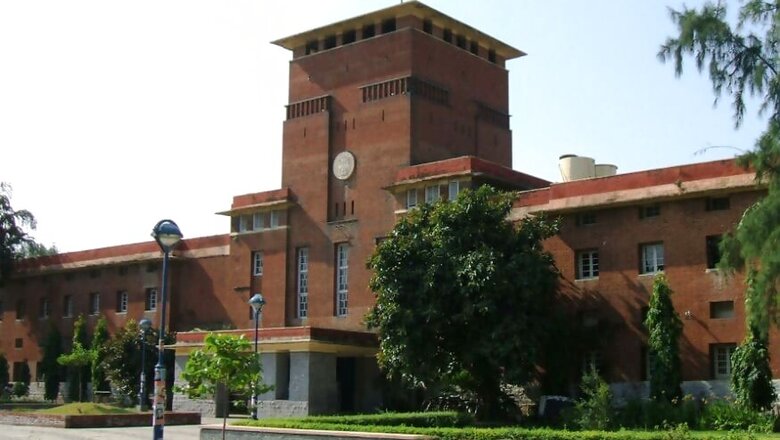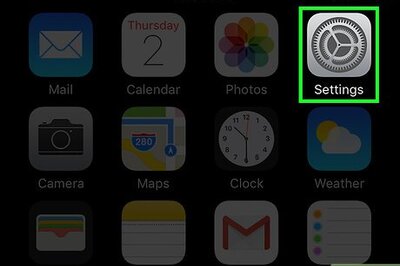
views
Delhi University dean examination has issued guidelines for ''Open Book - Take Home" examinations for students of final year of all streams, regular, SOL and NCWEB, which the Delhi University Teachers Association objects to calling it "discriminatory" and guidelines made by side-lining the academic council and teachers’ representatives.
As per the circular of the Open Book Exams, the remote examination would be conducted for final year students only for UG and PG programs. Students are supposed to appear in examination from their homes and will download question papers for their respective course from the portal. Students will attempt questions on plain papers as per instructions.
Further it said that the concept of open book examination would be introduced, where in the student can refer books notes and other study materials to answer the questions. The duration for examination would be two hours. One hour additional would be given for downloading the question paper, scanning the answer sheets, and uploading the answer sheets.
As per the guidelines the student will upload on to the portal, the answer sheet within three hours from start to examination. Since it is an open book examination the question need to be framed in a manner which would test the understanding and analytical skills of the students and there should be no/minimum scope for verbatim copying from books and study material.
There will be three sets of question paper for each course of both UG and PG programs related to your department to be set and subsequently moderated by the department. For ease of evaluation using examination portal. It is requested that the question papers should have six questions out of which four are to be attempted by the students in 2 hours. All questions should have equal marks. The guidelines said that there should not be any parts to any questions. Maximum marks would be 75.
All questions papers are expected to be uploaded sent at the earliest but not later than 3rd June 2020.
DUTA OBJECTS AND SUGGESTS ALTERNATIVES
The teachers of the union are upset that "in deciding this form of Examinations, the University has set aside the detailed feedback from the DUTA, inputs of several Deans and students' petitions," said the letter written to the VC Yogesh Tyagi by DUTA president Rajib Ray and secretary Rajinder Singh.
The teachers reiterate their opposition to an online remote-process examination is as "it is discriminatory and unfair".
"It is also not viable for a large University like DU, with its diverse student population, and it is shocking that the University has adopted it as the only form. The teachers demand that "the pen-paper option be given to all students. A large number of Universities have extended their session in order to do so."
"As in some other universities, the University could also explore the possibility of granting degrees to students based on their marks obtained in IA or on the average CGPA of 5 semesters."
QUESTIONS RAISED OVER THE FORMATION OF WORKING GROUP ON EXAMS BY DU
The teacher’s organization reiterated that demand for the inclusion of elected teacher representatives to the "Working Group on Examinations", notified on May 8, which "has been summarily ignored."
The university had constituted a 15-member Working Group on Examinations, which DUTA said "has hardly any representation of Departments (it includes only the Dean, Faculty of Social Sciences), colleges and Statutory Bodies."
As a result, the very composition of the 15-member Working Group suggests that it is geared towards pushing decisions in a top-down manner.
DUTA said in the letter, "We believe that wider consultation with teachers is necessary if the key processes of the University, which primarily includes Internal Assessment, Examinations and Admissions, are to be satisfactorily carried out. Teachers would be able to provide significant feedback as they are connected to the students and their everyday realities."
The fact that the University is giving piecemeal instructions instead of outlining a complete comprehensive proposal with suitable modifications to the Academic Calendar has added to the uncertainties faced by teachers and students.
"We demand that the University first expands the Committee to include elected representatives and then places the entire proposal before the Statutory Bodies before issuing such instructions that create confusion and spread panic rather than providing clarity."
The members of Academic and Executive Council also raised objections to it saying, 'We have been consistently writing you over the online examinations and handpicked working group for examination citing statutory violations, side-lining students' interest, cyber security issues and arbitrary and authoritarian decision making, but the university administration is moving ahead with its own predetermined agenda ignoring those correspondences," said the statement from some of the EC and AC members.
They are of the view that for the university administration, "are the HoDs outside the purview of the stakeholders and merely implementer of such an order? It is a matter of serious concern that there was no discussion with the HoDs before this letter was dispatched as an 'order'."
This unilateral move to organise remote open book Exams to be attempted at home by the students of Delhi University will push the higher education towards privatization by devaluing it's degrees and dilute their rigour, the members further said.
ONLINE EXAM DISCRIMINATORY
The teachers outfit said that most teachers and students strongly believe that online examinations are totally discriminatory to all those students who do not have access to technology in all its forms (printers, scanners, computers even in many cases and reliable and stable internet connections).
"A large number of surveys have shown that accessibility to connectivity, laptops/netbooks and gadgets to facilitate printing and scanning is extremely poor. Students are worried that technical glitches in assessing question papers on time and in depositing scripts etc. may prevent them from focusing on the exam," DUTA letter stated.
"The ability of the DU website to handle such a heavy load is also a point of concern as many students have reported difficulties even in submitting the examination form," it added.
The worry is that the concept of an Open Book Examination is very different from the kind of examinations students are used to taking "and it will be springing this ugly surprise on them in such uncertain and anxiety-ridden times is a move that will increase the anxiety for large sections of students, especially since the normal teaching-learning process has been disrupted due to the pandemic."
The teachers said that they have already conveyed to administration on more than one occasion that the DUTA considers "online methods of teaching cannot substitute face to face teaching and hence, a system of examination that does not take into account this aspect is unacceptable."
For the differently-abled students who form a sizable part of student community this spells trouble. "Lack of material in their remote locations, arranging for writers, etc. are some of the issues."
NO ADHERENCE TO ACADEMIC APPROACH
The guidelines issued for setting of question papers and for conduct of Internal Assessment reflect a bureaucratic approach, without reflection of academic concerns said the DUTA letter to the VC, for example, "the strict adherence to the pattern of 4 questions to be attempted out of 6 fails any logic."
The teachers outfit objected saying, "Having a standard format and that too without sections is a very mechanical approach to conducting examinations considering that we have extremely diverse courses, whose specific nature and mode of testing vary greatly."
In view of the fact that teaching through e-resources has been uneven and has failed to reach large sections of students, and the fact that many students were taken by surprise by the lockdown and found themselves without notes, materials and even their books, “the sensible approach would be to provide ample choice in exam (more than what departments would think of in normal times) so that students are not subjected to unnecessary stress," it said.
According to them the Guidelines also ought to have been discussed in statutory bodies. "The contradictory suggestions about attendance, etc. that have been circulating have added to the confusion. We fail to understand why the Academic Council the appropriate decision making body is being side-lined," DUTA wondered.
















Comments
0 comment